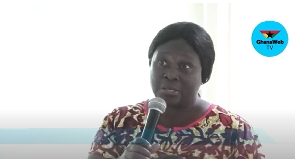The Senior Programme Manager at SEND GHANA, Harriet Nuamah Agyemang, has called on the government to ensure that all the levies it is taking from the citizenry go into productive, tangible developments for the people.
She said that it is important that the government continues to take levies on a number of things in the country, however, it must ensure that those paying those levies experience what those revenues are being used for.
Speaking on the side-lines of a national dialogue to discuss the findings of the 2023 budget, she urged the government to show practicality in how it expends the various levies it collects from the public.
“Generally, we see an increase in allocation for capital expenditure, which means that we are going to see a lot of infrastructural development in our country and we appreciate that. We also see that social protection is going to receive some monies, especially for LEAP, we want government to come clear as to whether they are increasing to GHc90 per two months, or it’s going to be monthly.
“We have also noticed that some of the levies we are charging; those are mandatory – we’ll pay them: we have the GETFund Levy, we have the Health Insurance Levy, we have the COVID-19 Levy, we have the Pollution and Sanitation Levy, and several other levies – Street Lightening Levy. We’re not saying government should take them off. Government can continue to take those revenues but we want to see those revenues go to work for the people of Ghana. So, if we have COVID-19 levies, we should see the funds going to support the health sector, epidemic preparedness, or public health preparedness such that if we should have any outbreak, we can withstand it.
“Same, if we have GETFund and it’s supposed to support scholarships and development of infrastructure in the education sector, then we do not have to see an overflow of dormitories in secondary schools, for instance. We do not have to have our children sitting under trees, so that GETFund will go to work for the people of Ghana, for the children of Ghana,” she explained.
She also outlined a number of modalities that government can use in addressing the infrastructure challenges in the country.
Watch her speak about it in the video below:
AE/WA
General News of Thursday, 22 December 2022
Source: www.ghanaweb.com

















